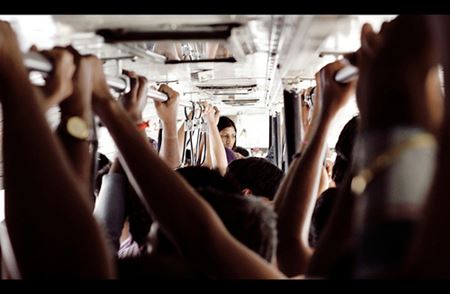Personal Space
"Don't stand
Don't stand so
Don't stand so close to me"
- Don't Stand So Close To Me, by The Police
(yes, I know what this song is about, the refrain just works for this so go with it)
There are ups and downs to having personal space.
Growing up in the US, I learned that everyone has their own bubble of space around them*. We all know 'that person' who doesn't respect the bubble: the person who starts a conversation by stepping forward and leaning in so that there's less than a foot of space between you and them, and suddenly you're focusing not on what they're saying but on trying to casually step back without offending them, because you really don't want to smell their breath. Or the person who stands a bit too close behind you in line, and you're uncomfortable because you don't want to feel their breath. We are taught to avoid these social missteps with one simple rule: respect the bubble, because everyone likes to have their space.
People in South America don't have this rule.
The other day I was in a grocery store and a woman stood so close in line behind me that every time she moved, her elbow prodded by back. I couldn't move forward without bumping my cart into the person in front of me so I just glanced back at her. She didn't take the hint. Then someone brought her a cart which she pushed into me. When I moved to begin unloading my groceries, she shoved her cart into mine before running to get a last item. Here in Ecuador, people are very concerned about loosing their place in line. It's a push-comes-to-shove-very-quickly society. Every man for himself. Lines are formed, but if you don't keep moving someone will step ahead of you. If you don't drive the moment a light turns green, people start honking. It's just how it is.
Here, everyone greets each other with a "besito". That's when you lean forward and touch cheeks while making a kissing sound. Some people, if they are very close to the other person, give an actual peck on the cheek, but most just kiss the air. This is the standard greeting for everyone. Of course in the US, people have their preferences. You might go in for a hug and someone holds out their hand instead, or turns sideways to give a simple side-hug. It's just personal preference for what kind of contact you desire, how you want someone to invade your bubble or not.
In Ecuador, every bus costs a mere twenty-five cents, and since many people don't have cars, rush hour for buses can be insane. I've had people 'helpfully' push me onto a crowded bus before the doors squeezed closed, because I wasn't going to be able to shove in on my own. There I stood, packed like a sardine along with tons of other people. I've had strangers grab my arm to keep their balance because they couldn't reach a hand-hold. I've had to learn how to be okay with strangers pressed all around, and how to elbow my way through a crowd.
These may sound like bad things, and it's true that they were difficult to get used to. Honestly some days I still feel frustrated, swearing in my head, "Just give me some space!". But there are good things too. Like how the boys of Casa Gabriel will put their arms around each other in companionship. (the other evening, we were all sitting in the living room and Luis, one of the new boys, fell asleep leaning against Carlos's shoulder, after Carlos put his arm around him in a protective, big-brotherly style). How women will walk down the street arm-in-arm, sometimes sharing an umbrella this way, sometimes just being close friends. There is no stigma to it. If we saw that in the US, we might wonder about them, yet here no one thinks anything except that they are friends. In a culture where so many children are abandoned and abused, they need the assurance of love from friends. In the US we're taught that babies and children must be held and hugged and nurtured for them to thrive. So many of the things we learn and take for granted they are still barely learning in South America and may not even be able to do. A mother whose husband/boyfriend has left and who is struggling to buy food doesn't think about nurturing her child. She thinks about survival.
In a crowded bus, everyone may be pushing and shoving but they're all in it together. The strangers who grab a hold of my arm for support know it's okay because they would let someone else do the same to them. They - we - are all fighting for our space in line, etc., while all the while acknowledging that everyone else is doing the same. It's just how it is. No one has time to think about someone's personal bubble. They squeeze onto a packed bus and then hold hands with their best friend walking down the street, because that's how it all balances out.
Once, I was sitting in the back of a crowded bus, eating an apple. I held the finished core in my hand, when the man pressed against my left side offered to throw it away for me. He took the sticky core and tossed it in a trash can I couldn't reach. It was a tiny thing, but I - who had been sitting there somewhat annoyed that I had to be touched by strangers - was so thankful. My bubble was invaded, and someone took the opportunity to do a small, kind thing. Faith in humanity restored.
There will likely always be days when I'm frustrated with cultural differences. But if I can try and understand, then I can see the good in it too. Different can be good, too.

Comments